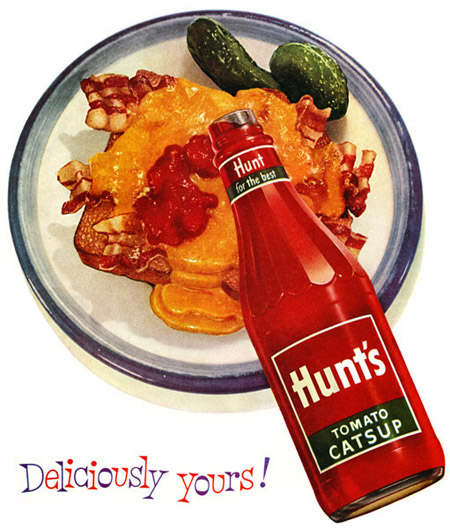
Once upon a time catsup was the only word used to describe ketchup but this all changed in the late 1880s. What is Difference between Ketchup and Catsup.

Heinz chose the spelling ketchup to print on their labels but catsup and catchup are acceptable spellings used.
Catsup vs ketchup history. Catsup is a word used to describe what is now widely known as ketchup. In some countries this sauce is also referred to as tomato sauce. Once upon a time catsup was the only word used to describe ketchup but this all changed in the late 1880s.
If you think about ketchup today the first name that comes to mind is Heinz. The name was changed to catsup and by the late 1700s astute people of New England added tomatoes to the blend of fish sauce. Slowly and steadily ketchup began a series of molts to become the ketchup we know of today.
The word catsup entered the English language in 1690 while the spelling ketchup entered the English language in 1711. Catsup and Ketchup are two different spellings of the same condiment which today is a Westernized version of a condiment first introduced to European traders in the late 17th century. During their time trading in the Far East British sailors of the 1600s developed a taste for the delicious treat we now call ketchup and began exporting it to the West.
So the fact that ketchup and catsup existed at the same time is no surprise which led to two different spellings of one thing. From the 1900s up to the 1960s catsup was the more commonly used term. After the 1960s however ketchup began to take over as the dominant term for the condiment both in American and British English.
History and Origin of word Ketchup could have been called as ke-chiap from Southern coastal Fujian region or it could be termed as Kicap from Indonesia. Ke-chiap and Kicap both are the sauces based on shellfish pickled fish spices and herbs. Both Catsup and Ketchup are acceptable spellings that are used alternatively with Ketchup.
Ketchup and catsup are simply two different spellings for the same thing. A modern Westernized version of a condiment that European traders were introduced to. Over the years ketchup has evolved from the bottle to the large pump small packets and even a short-lived selection of different colored varieties with the addition of food coloring.
Heinz chose the spelling ketchup to print on their labels but catsup and catchup are acceptable spellings used. Its Americas favorite condiment but ketchups long history dates back to imperial Chinaand at one point it was completely tomato-free. With a little help from being firsties and pressure from the feds ketchup clearly reigns supreme.
Even though it was never officially declared a vegetable ketchup was later found to contain Lycopene an antioxidant associated with decreased cancer riskwhile catsup has. In 1988 Hunts decides its time to change the name of their catsup to ketchup. Apparently sounding fancy wasnt drawing enough people to their product.
Changing the name doesnt work. Ketchup is about 5 times more common than the alternate spelling catsup. Over time it has changed from a fish-based condiment to a tomato-based condiment.
It originated in China in the 1600s at which time it consisted of pickled fish and other spices. Catsup different brands have different spellings originated in Asia where its name was derived from ket-tsiap Chinese ketchup Malayan or kachiap Thai meaning a spicy sauce of or for fish. History indicates Portuguese traders took tomato seeds to Macao a southeast island of China.
History Banana ketchup was deemed a cheaper alternative than tomato ketchup since bananas were abundant in the Philippines. 1 Philippine food technologist Maria Y. Orosa 18931945 is credited with inventing the banana ketchup recipe.
We asked America if theyd like a combination of creamy HEINZ Real Mayonnaise and our world-famous HEINZ Ketchup and they said YES By voting in what turned into the largest poll in Twitter history the entire country helped us introduce HEINZ Mayochup to the world. Smith wrote in Pure Ketchup that the spelling catsup was once the most popular but now ketchup is the preferred spelling in most regions. He quotes the 1831 book Domestic Chemist which says ketchup is a sauce of which the name can be.
What is Difference between Ketchup and Catsup. In todays world ketchup and ketchup both refer to the spicy version of tomato sauce mixed with vinegar that is available around the world and is a popular accompaniment to snacks. When war broke out and imports were halted Filipinos needed to figure out another way to get their ketchup fix.
The National Historical Commission of the Philippines credits the ingenious method of using banana as the base ingredient for ketchup to food technician and war heroine Maria Ylagan Orosa. The Batangas-born scientist studied Chemistry Food Chemistry and Pharmacy in the United.